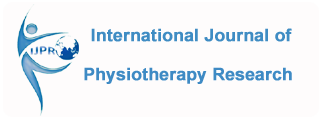IJPR.2017.192
Type of Article: Original Research
Volume 5; Issue 4 (August 2017)
Page No.: 2289-2292
DOI: https://dx.doi.org/10.16965/ijpr.2017.192
EFFECT OF CERVICAL MUSCLE FATIGUE ON POSTURAL STABILITY
Shailesh Gardas *1, AmrutaNerurkar 2, SujataYardi 3.
*1 Lecturer, MGM College of Physiotherapy, Kamothe, Navi Mumbai, Maharashtra, India.
2 Associate Professor, School of Physiotherapy, Dr. D. Y. Patil Department of Physiotherapy, Navi Mumbai, Maharashtra, India.
3 Hon. Professor, School of Physiotherapy, Dr. D. Y. Patil Department of Physiotherapy, Navi Mumbai, Maharashtra, India.
Corresponding Author: Mr. Shailesh Gardas, Lecturer, MGM College of Physiotherapy, Kamothe, Navi Mumbai- 410209. Tel: (022) 27863485; (022) 274278866; (022) 274278877; (022) 274278872. E-Mail: mgmcopt@hotmail.com; mgm_physiothrapy@yahoo.co.in.
ABSTRACT
Background: Postural stability is the ability to maintain the body in equilibrium either at rest or in a steady state of motion. Muscle fatigue is the diminished response of muscle to repeated stimulus. Cervical proprioceptive inputs provide important somatosensory information influencing postural stability. Hence, we performed this study to evaluate the effect of experimentally induced fatigue on general cervical musculature on postural stability.
Aim: To study the effect of experimentally induced cervical muscle fatigue on postural stability.
Materials and Methods: 30 subjects who met the inclusion criteria were recruited in the study with their prior consent. Fatigue was induced in the cervical muscles using a pressure biofeedback machine. Postural stability was assessed using Modified CTSIB and Multi-directional Reach test both before and after inducing fatigue.
Results: Postural sway significantly increased post fatigue in all sensory conditions of Mod-CTSIB: EO AP – 0.0189, EO lateral p- 0.0001, EC AP p- 0.0223, EC lateral p- 0.0037, FEO AP p- 0.0033, FEO lateral p- 0.0148, FEC AP p- 0.0010, FEC lateral p- 0.0072. Multidirectional reach reduced significantly in all 4 directions post fatigue: MDRT Anterior p<0.0001, MDRT Posterior p < 0.0001, MDRT Rt lateral p <0.0001, MDRT Lt lateral p <0.0001.
Conclusion: Cervical muscle fatigue produced a significant disturbance on balance as seen by: Increased sway in Modified CTSIB & Decreased functional reach in Multidirectional reach test.
Key words: Postural stability, Fatigue, Modified-CTSIB, Multidirectional reach test.
REFERENCES
- Motor control Translating research into Clinical Practice, 3rd Edition, Anne-Shumway-Cook & Majorie. H .Woolacott.: 158.
- Eythor Krist et al: Sensorimotor function and dizziness in neck pain: JOSPT, 2009 Volume 39.Number 5: 364,365.
- Riemann BL, Lephart SM The sensorimotor system, part I: the physiologic basis of joint stability. J Athl Train. 2002; 37: 71-79.
- Pallavi Khanna, Gagan Kapoor, Kalpana Zutshi; Balance deficits and recovering timeline after different fatigue protocols: Indian Journal of Physiotherapy and Occupational Therapy: Vol. 2 No. 3; 2008-2007 – 2008-2009.
- Carolyn Kisner & lynn Allen Colby: Therapeutic Exercises Foundations & Techniques; 4th Edition: 63
- Jull G. et al; Whiplash, Headache and Neck Pain: Research based directions for Physical Therapies: 57-61.
- Nicholas Vuillerme, Nicholas Pinsault and Jacques Vaillant: Postural Control during quiet standing following cervical muscle fatigue; Neurosciences Letters 378(2005) 135-139.








